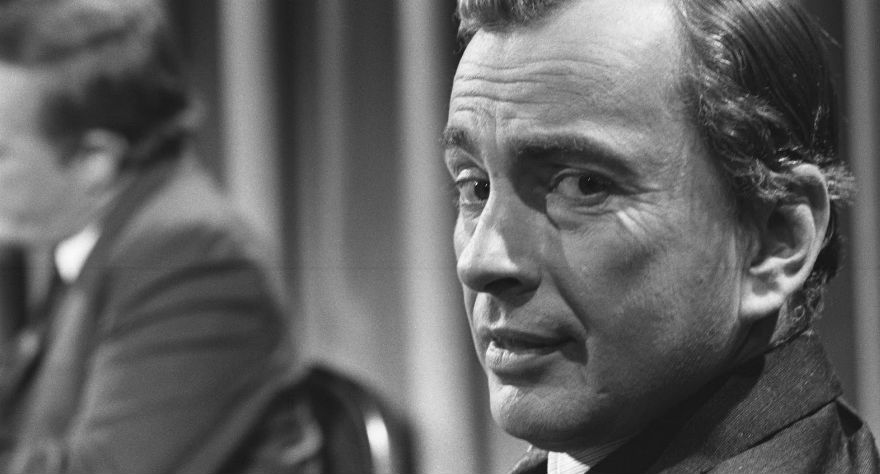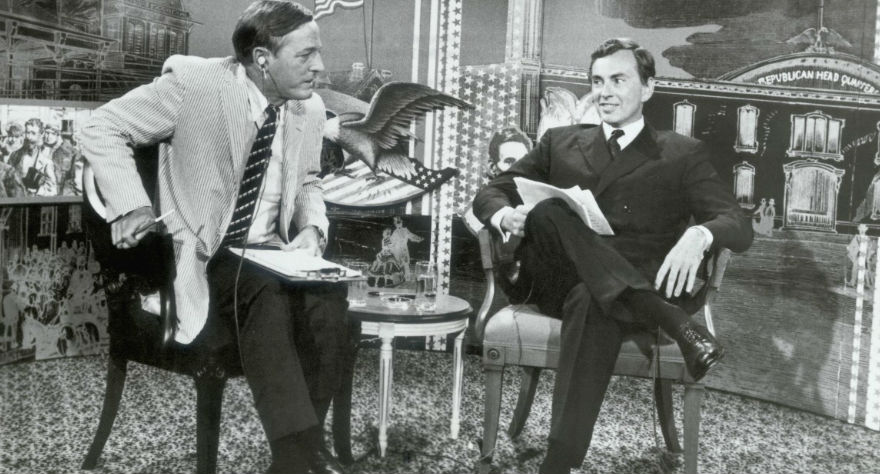Robert Gordon On the Verbal Bloodsport of ‘Best of Enemies’

Back in 1968, two of the most brilliant political minds in the country butted heads on a televised series of live debates, “unconventional coverage” of the Democratic and Republican presidential elections that saved ABC News from the TV ratings freefall it had been stuck in for months. The pundits were liberal leader Gore Vidal and the conservative party’s William F. Buckley, and their vicious, ungodly eloquent debates would go down as some of the best live television that’s ever aired.
Their hatred for one another and the explosive, damaging contention between them came to define the rest of their lives, however, as their war wounds from the debates would continue haunt them till their dying days. Robert Gordon and Morgan Neville’s documentary Best of Enemies presents the debates in an almost sports-doc fashion, profiling the verbal combatants and doing a sort of play-by-play of their bitter battle. It also delves into the damage it caused each of them in their private lives as well as exploring the bizarre parallels between their respective life journeys.
I spoke with Gordon in San Francisco about making the film and fashining their story in to a modern myth that highlights its relevancy to today’s political climate.

What’s made the Vidal/Buckley debates so enduring and captivating for so many years?
It’s verbal bloodsport. These are gladiators in the coliseum, fighting for their lives. Actually, what these guys are fighting for is the future of their country. They see that the other is dangerous to their country and that if the other is allowed to ascend, the country will go to ruins. It’s a superheroes’ battle. When I saw the raw debates for the first time, which is how I got into this, I couldn’t believe that the culture wars of the early 21st century were being expressed by two guys in the 20th century. 40-plus years ahead of their time, they were articulating the debates we’re having now.
And better than we do.
[laughs]
The footage is great, but I think what you guys do is accentuate the sense of urgency that runs through the debates. You up the intensity.
The urgency was there; our task was to maintain the urgency. In the raw footage, that urgency ebbs and flows, but even when it ebbs, it’s there. We started in 2010, but we didn’t really get to make it until 2014. We found out that lots of people didn’t know who they were. I don’t know how old you are, but had you heard of these guys?
I had, but I didn’t know a whole lot about them.
Many people just don’t know who they were. That gives us an opportunity to tell some of their biographies. Their biographies are strangely parallel, yet resulted in a diametric opposition. We tried to make every step a step of them coming closer to each other even as they got further apart. It was full of tension. The more we got into it over the years, the more there was to tell.
I’m a big fight fan. I watch a lot of UFC and boxing. There isn’t always animosity between the fighters, but when there is, there’s typically a point in the fight when they look each other in the eye and realize that they’re cut from the same cloth. They begin to respect each other, sometimes even relate to each other. Do you think Vidal and Buckley ever had a moment like that or did they always hate each other?
I think they always hated each other. I think Buckley had a moment where he realized Gore was his intellectual equal. Buckley came in with a sense of superiority, but there came a time when he had to accept that he couldn’t dismiss this guy in the way he intended to. Vidal understood that about Buckley going in, but it wasn’t a matter of respect. Buckley was capable of change. He was a guy who would later support the Iraq war, and then publicly change his mind. That was something I admired in him. He wasn’t afraid to build a coalition and then go against the coalition he built.
It’s almost eerie how parallel their lives are and how much they have in common aside from their political viewpoints. They almost begin to blend together as the story moves forward. It’s strange.
There’s something star-crossed about them. There’s an interesting way to look at this. Buckley and Norman Mailer were friends with opposing beliefs. But that’s nowhere near as interesting. There’s something in our nature that likes to gawk at the car crash, the fireworks. To make a leap here, I think that TV today has forsaken everything for the fireworks. With Vidal and Buckley, they were given fifteen uninterrupted minutes. No one today is given fifteen uninterrupted minutes. No one is given eight minutes to make their argument. These guys’ arguments grew and grew and grew, and the whole debate grew. You don’t get that anymore. You just get that Roman candle explosion. You don’t get the fuse. You don’t get the fire.
What was hard about fashioning the footage and research into a story?
Fitting it into 90 minutes. [laughs] We didn’t want a film that was too long.
Was 90 the goal?
80 was the goal. The movie’s 87. And I don’t think it’s fat. We cut out some really interesting stuff. Both Vidal and Buckley had early book publications that defined their careers: Gore’s The City and the Pillar and Bill’s God and Man at Yale. There were steps in their parallel lives, whole scenes that were cut.
Was it immediately clear which scenes to cut out or was there a debate?
There was some debate over the debates themselves. How much was enough? I saw the raw debates and loved every second of it. I believed strongly in the debates. At one point, the editors were putting music under the debates to maintain interest. I was like, no no no. We ended up in a compromised position. At some points, when a commentator’s about to come in, we begin the music. It’s a sort of easing of the segue, and I’m cool with that.
These two guys were intellectually superior individuals, good looking (one of them, at least) and incredibly successful in almost all of their career pursuits. But as the story unfolds and they get older, you begin to realize that they were both weirdos in a way, at least in society. They’re isolated in their genius.
They both were conquerors rising to the top. They both had very active social lives and thrived on that, but at the same time, you had this cantankerous Gore who always wanted to be alone. It’s just the way people choose to live their lives, I guess.
I almost lost it watching that clip of Buckley on Charlie Rose talking about death.
Good. That makes me feel good. It’s really powerful. If you watched that clip raw, you wouldn’t feel that. But since you’ve had time for these things to develop, seeing that clip can be full of meaning. All of those moments peak in that clip.
The piece of footage of the final debate where Buckley says that regrettable thing—I thought that was going to be the big, climactic moment of the movie. I thought there’d be a little more story after that, but that was the big “moment,” if you will. So the Charlie Rose clip took me totally off guard.
Vidal purposely misquoted Socrates. Socrates said, “The unexamined life was not worth living.” Vidal said, “The untelevised life is not worth living.” There were mountains of archival material for us to go through. I’m sure we missed diamonds, but we also found a lot of gems.
Of the two of them, who would you be more frightened of interviewing, like we’re doing here and now.
Totally Vidal. And we did it with Vidal. He died in 2012, and in late 2010 we arranged to interview him in LA. He was in decline and in a lot of physical pain. He was paranoid and generally unhappy. So we march in there and set up our interview with great trepidation. I felt like he was a man who would take great pleasure in exposing my ignorance and chewing me up coarsely and spitting me out. He’s in a wheelchair and he’s wheeled into the interview room. He’s not looking at anybody and he’s not talking. It’s very clear that he’s just withdrawn. A guy on the crew says, “My grandfather served on the Aleutian islands in World War II when you were there. He said he could never get warm.” Gore raises his eyes, shoots darts and says, “I had my rage to keep me warm.”
